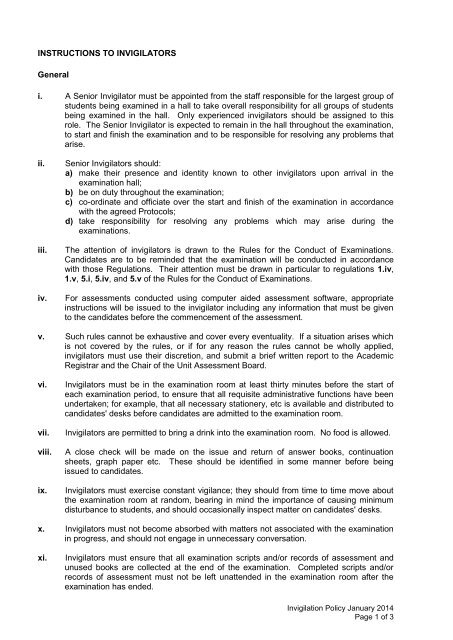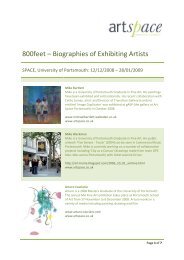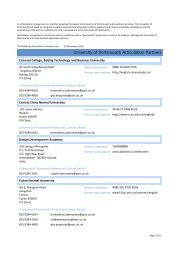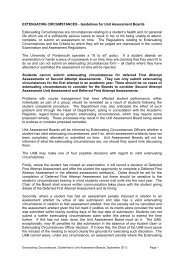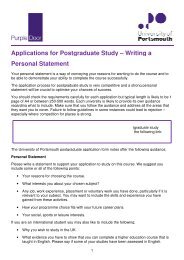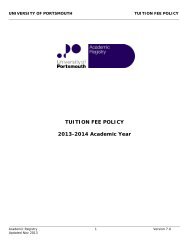Invigilation
Invigilation
Invigilation
You also want an ePaper? Increase the reach of your titles
YUMPU automatically turns print PDFs into web optimized ePapers that Google loves.
INSTRUCTIONS TO INVIGILATORS<br />
General<br />
i. A Senior Invigilator must be appointed from the staff responsible for the largest group of<br />
students being examined in a hall to take overall responsibility for all groups of students<br />
being examined in the hall. Only experienced invigilators should be assigned to this<br />
role. The Senior Invigilator is expected to remain in the hall throughout the examination,<br />
to start and finish the examination and to be responsible for resolving any problems that<br />
arise.<br />
ii.<br />
iii.<br />
iv.<br />
Senior Invigilators should:<br />
a) make their presence and identity known to other invigilators upon arrival in the<br />
examination hall;<br />
b) be on duty throughout the examination;<br />
c) co-ordinate and officiate over the start and finish of the examination in accordance<br />
with the agreed Protocols;<br />
d) take responsibility for resolving any problems which may arise during the<br />
examinations.<br />
The attention of invigilators is drawn to the Rules for the Conduct of Examinations.<br />
Candidates are to be reminded that the examination will be conducted in accordance<br />
with those Regulations. Their attention must be drawn in particular to regulations 1.iv,<br />
1.v, 5.i, 5.iv, and 5.v of the Rules for the Conduct of Examinations.<br />
For assessments conducted using computer aided assessment software, appropriate<br />
instructions will be issued to the invigilator including any information that must be given<br />
to the candidates before the commencement of the assessment.<br />
v. Such rules cannot be exhaustive and cover every eventuality. If a situation arises which<br />
is not covered by the rules, or if for any reason the rules cannot be wholly applied,<br />
invigilators must use their discretion, and submit a brief written report to the Academic<br />
Registrar and the Chair of the Unit Assessment Board.<br />
vi.<br />
vii.<br />
viii.<br />
ix.<br />
Invigilators must be in the examination room at least thirty minutes before the start of<br />
each examination period, to ensure that all requisite administrative functions have been<br />
undertaken; for example, that all necessary stationery, etc is available and distributed to<br />
candidates' desks before candidates are admitted to the examination room.<br />
Invigilators are permitted to bring a drink into the examination room. No food is allowed.<br />
A close check will be made on the issue and return of answer books, continuation<br />
sheets, graph paper etc. These should be identified in some manner before being<br />
issued to candidates.<br />
Invigilators must exercise constant vigilance; they should from time to time move about<br />
the examination room at random, bearing in mind the importance of causing minimum<br />
disturbance to students, and should occasionally inspect matter on candidates' desks.<br />
x. Invigilators must not become absorbed with matters not associated with the examination<br />
in progress, and should not engage in unnecessary conversation.<br />
xi.<br />
Invigilators must ensure that all examination scripts and/or records of assessment and<br />
unused books are collected at the end of the examination. Completed scripts and/or<br />
records of assessment must not be left unattended in the examination room after the<br />
examination has ended.<br />
<strong>Invigilation</strong> Policy January 2014<br />
Page 1 of 3
xii.<br />
xiii.<br />
xiv.<br />
xv.<br />
Each invigilator shall be responsible for no more than thirty candidates. Where there is<br />
more than one student present, there must be a minimum of two invigilators.<br />
The examination room must not be left unattended after the examination papers have<br />
been distributed and during an examination.<br />
In case of illness, the names and telephone numbers of first aiders, together with the<br />
location of the nearest telephones, will be displayed in each examination hall. If a first<br />
aider is not available, the invigilator must decide whether or not to summon an<br />
ambulance.<br />
Where examinations are held in departmental accommodation, the Head of Department<br />
shall ensure each invigilator is given the relevant information about first aiders,<br />
telephones etc, available locally.<br />
1.1. Before the Examination<br />
i. All appropriate stationery except the examination question paper is to be placed on the<br />
examination desks before the candidates enter the hall.<br />
ii.<br />
iii.<br />
iv.<br />
Candidates should be admitted at least 10 minutes before the examination is due to<br />
commence. Invigilators should direct candidates to the seating area for their subject.<br />
Candidates entitled to any additional time, either by virtue of provision under the<br />
University's policy on dyslexia or by any prior agreement from the Head of Department<br />
or School, shall be admitted sufficiently early so as to allow them to use this additional<br />
time before the examination begins and to finish at the same time as the other<br />
candidates.<br />
The Senior Invigilator should issue an instruction for candidates to complete the details<br />
on the front of the examination script and any attendance slips. Five minutes before<br />
commencement time the Senior Invigilator should call for silence and remind candidates<br />
of the Rules for the Conduct of Examinations, bringing their attention in particular to the<br />
sections identified in 1.iii. Candidates should also be reminded that they must switch off<br />
any mobile telephones or other means of electronic communication.<br />
Once silence has been called for, the examination papers should be distributed as<br />
expeditiously as possible. The Senior Invigilator should check that all candidates have<br />
the correct examination paper. The examination will then commence.<br />
v. Commencement and ending times should be announced. The Senior Invigilator should<br />
ensure that the examination starts promptly at the scheduled time.<br />
vi.<br />
Where the assessment is conducted using computer aided assessment software,<br />
specific procedures will be given to the invigilator regarding commencing the<br />
assessment.<br />
1.2. Ending the Examination<br />
i. The Senior Invigilator should issue an instruction to all candidates to stop writing<br />
immediately - and to remain seated in silence until permission is given to leave.<br />
ii.<br />
Invigilators should collect all examination scripts or records of assessment, checking that<br />
the covers are correctly filled in, that "fold down" flaps are properly stuck down and,<br />
where necessary, scripts or additional stationery are adequately tagged together.<br />
<strong>Invigilation</strong> Policy January 2014<br />
Page 2 of 3
iii.<br />
iv.<br />
When all scripts have been collected the Senior Invigilator should instruct the candidates<br />
to leave the hall taking any litter with them.<br />
Where the assessment is conducted using computer aided assessment software, the<br />
candidate will automatically be timed out at the end of the examination. Late arrival<br />
candidates must be instructed to finish at the stated end time.<br />
1.3. Emergency Procedures - Evacuation of Examination Halls<br />
i. In the event of an Alarm Bell being sounded the hall must be evacuated immediately and<br />
without question.<br />
ii.<br />
iii.<br />
iv.<br />
Invigilators should instruct candidates:<br />
a) to stop writing or typing;<br />
b) to leave all scripts and examination papers on their desks;<br />
c) not to communicate with students or staff regarding the examination;<br />
d) to leave the room as quickly and quietly as possible and proceed to the designated<br />
assembly point.<br />
The Senior Invigilator will note the time at which candidates were told to stop writing.<br />
After ensuring that all candidates have left the examination hall and are assembled<br />
together, the Senior Invigilator will inform candidates:<br />
a) that if possible the examination will be resumed at the earliest opportunity with<br />
appropriate time adjustments;<br />
b) that while they are waiting they should not discuss the question paper with other<br />
candidates;<br />
c) that appropriate allowances will be made in the assessment of results.<br />
A Senior Invigilator must telephone the Academic Registrar (X3284) AS SOON AS<br />
POSSIBLE.<br />
v. The Academic Registrar will liaise immediately with the Head of Department or School in<br />
which the units affected are located, to determine what action is to be taken.<br />
vi.<br />
vii.<br />
If the examination can be resumed, on returning to the examination hall, candidates<br />
should be instructed to draw a line across the page immediately below their last<br />
sentence or workings, and to leave a clear space before continuing their work. For<br />
computer aided assessment, the invigilators will give the candidates specific instructions.<br />
Designated assembly points for central examinations accommodation, and the names of<br />
qualified first aiders at the relevant locations, shall be published annually by the<br />
Academic Registry as part of separately issued instructions to invigilators that shall<br />
incorporate these regulations and other relevant operational details.<br />
<strong>Invigilation</strong> Policy January 2014<br />
Page 3 of 3


